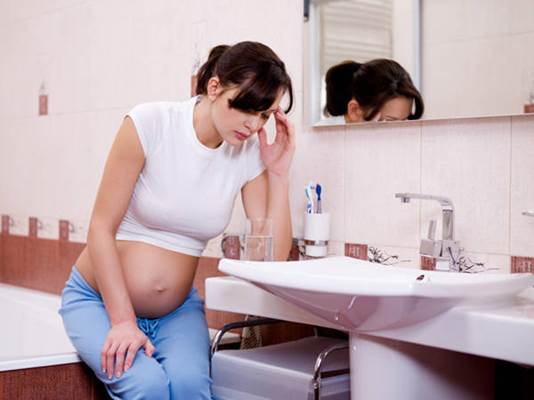Four out of 5 expectant women will
suffer from morning sickness. Here's how to find relief.
Of course, nobody likes the feeling of a
queasy stomach-whether it's after a loop-de-loop amusement park ride, during
flu season or following a night of a little too much of your favorite libation.
But for pregnant women who experience morning sickness (a misnomer, because
pregnancy-related nausea can occur during any time of the day), it's especially
tough. That's because not only do you feel bad quite literally, but you also
feel bad emotionally-because you worry whether your developing baby is getting enough
nutrients.

Four
out of 5 expectant women will suffer from morning sickness. Here's how to find
relief.
Truth is, for most women who have morning
sickness, you don't need to sweat it because your baby will get enough
nutrients during the course of your pregnancy. The trick, however, is also
figuring out how you can help yourself feel better and function throughout your
day.
The good news? Most cases resolve by 14
weeks (and get better with subsequent pregnancies). It might also help to know
that there may be an evolutionary reason why women experience morning sickness.
One theory suggests that in the past when people ate a lot of raw food that
could carry bacteria, nausea-which typically happens in the first trimester
when the baby is most vulnerable-helped the developing fetus avoid exposure to
toxins.
Biologically, we don't quite know why it
happens. It seems that something in the vomiting center of the brain is
stimulated during pregnancy to induce nausea. It may be linked to higher levels
of hormones (such as estrogen) during pregnancy. And you can add in two more
factors that contribute: your heightened sense of smell and the fact that your
digestive tract relaxes during pregnancy. As a result, the muscles guarding the
esophagus are less efficient, which causes an increased flow of acid from your
stomach into your esophagus.

Truth
is, for most women who have morning sickness, you don't need to sweat it
because your baby will get enough nutrients during the course of your pregnancy
That, of course, is no comfort if you feel
like the bottom of a bucket full of mop water. Here are some of our strategies
for helping to ease the nausea.
Eat early
Stash 100 percent whole-grain crackers
bedside and eat a few as soon as you awake. It helps to get something in your
stomach before you start your day.
Go for balance
Aim for a diet high in protein (such as
chicken) and complex carbohydrates (such as whole grains and vegetables). If
you start adding in rich, fatty foods, you may be more likely to suffer.
Seek out calories
If you're concerned about getting enough
nutrients, try chicken soup, which will help both hydrate you and give you some
calories. Also, eat more cold foods (hot foods may trigger nausea as they are
more likely than cold foods to have an aroma).

If
you're concerned about getting enough nutrients, try chicken soup, which will
help both hydrate you and give you some calories
Don't write off your symptoms
For severe sick-ness, you may want to talk
to your doc about prescription medications like scopolamine, promethazine,
Prochlorperazine and Trimethobenzamide. (All have been shown to be safe for use
during pregnancy.) If you can't hold liquids down for longer than 24 hours, you
may be suffering from a condition called hyperemesis gravidarum (meaning that
you vomit a lot). Some sufferers have to be admitted to the hospital to be
rehydrated. (Britain's Princess Catherine had this-so although it is miserable,
you are in good company.) Risk factors include multiple pregnancies, diabetes,
hyperthyroidism and a history of motion sickness. Not all morning sickness is a
"ride it out" problem and if you have severe nausea, you need to be
seen by a doctor to determine if you should be treated for dehydration.